Children’s of Mississippi submits document for Magnet designation
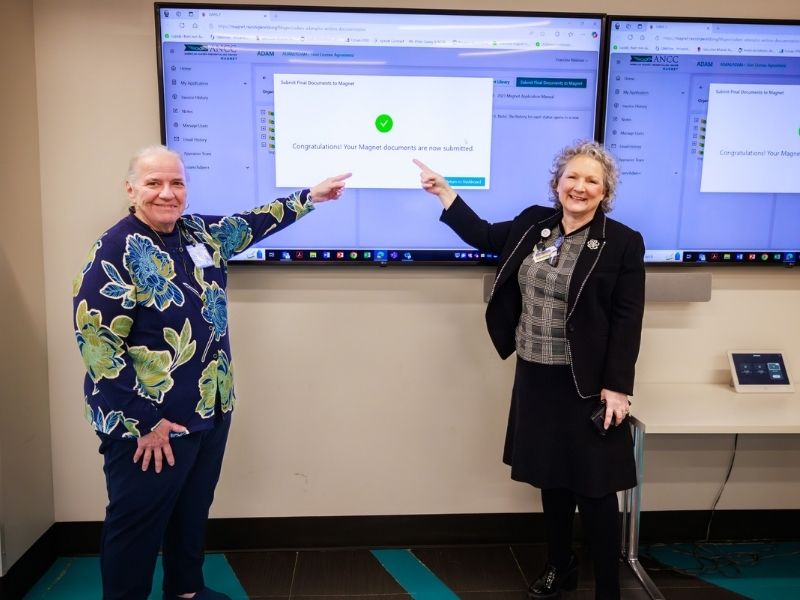
A laptop computer sat on three reams of paper, not for height but symbolism: The 1,500 sheets of paper represent the length of Children’s of Mississippi’s application for Magnet designation with the American Nurses Credentialing Center.
Children’s of Mississippi team members gathered in the Kathy and Joe Sanderson Tower’s BankPlus Community Room Tuesday to witness Fran Malenzi, Nursing Magnet Program director, hitting “submit” on the Children’s of Mississippi document. Cheers erupted, along with a caution of, “Don’t hit delete,” and hugs followed.
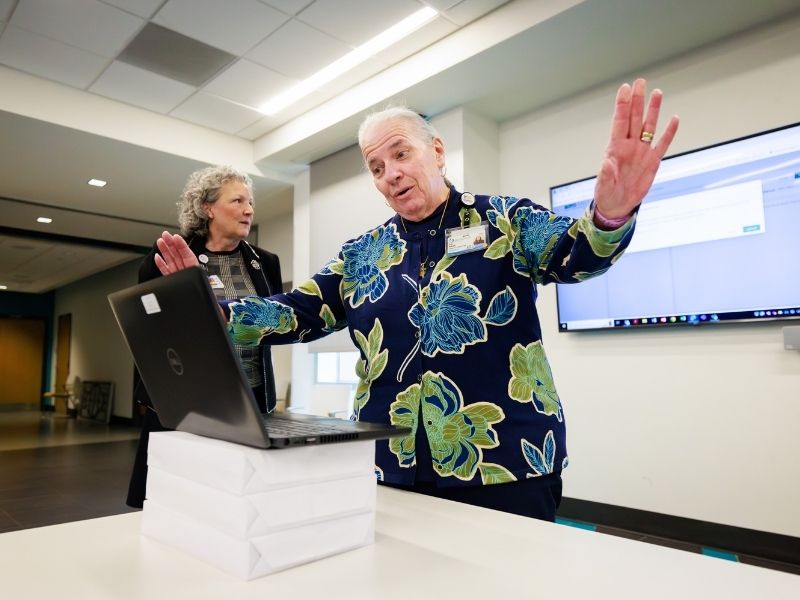
Only about 10%, or 612 hospitals, in the United States have achieved Magnet designation. Hospitals that have achieved Magnet status have higher rates of job satisfaction and patient safety.
After nearly a year of work preparing for and completing the document comes the next step in the process: a site visit to see if “the stories we wrote in our document are what we are actually living out in Children’s,” said Ellen Hansen, Children’s of Mississippi chief nursing and chief operations officer.
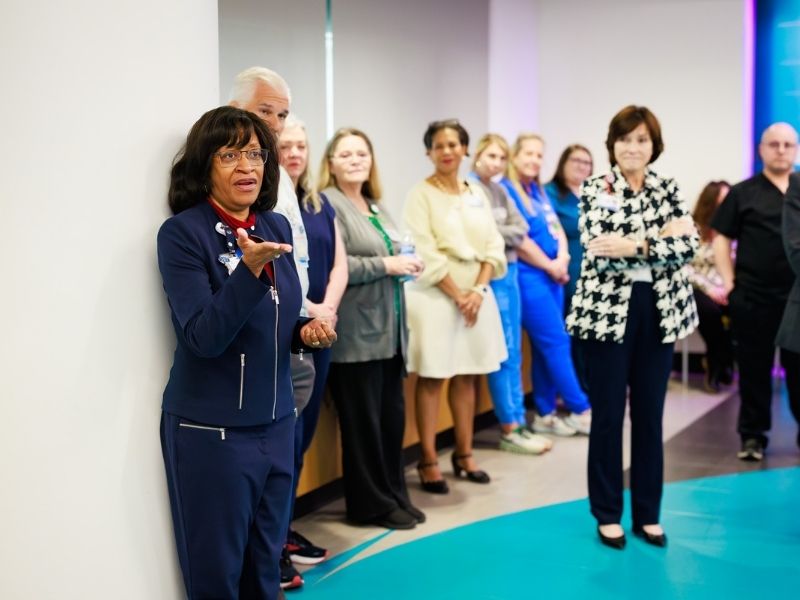
Telling the Children’s of Mississippi story through a Magnet document, said Dr. Kristina Cherry, chief nursing executive at the University of Mississippi Medical Center, “is reporting on what’s already been achieved.”
“The application, which can take four and a half years, was completed in a year because of this team,” Cherry said.
As part of the interdisciplinary Magnet process, Children’s of Mississippi has implemented a robust interprofessional governance model, increased the number of baccalaureate-educated nurses, increased the number of certified nurses and increased clinician involvement in clinical practice, research and publication, Hansen said.
Demonstrating Children’s of Mississippi’s recognition of the unique skills and values all disciplines bring is an essential part of the process.
"This pursuit is not just about earning a prestigious recognition,” she said. “Earning Magnet designation is about embodying the core values of integrity, excellence, innovation and compassionate care that define our mission. Our dedicated clinical team is at the heart of this effort, driving positive change and ensuring that every patient and family receives the highest standard of care."
Criteria for Magnet designation includes quality of care, effective leadership, a supportive work environment, innovation, evidence-based practice, professional development and high levels of patient satisfaction.
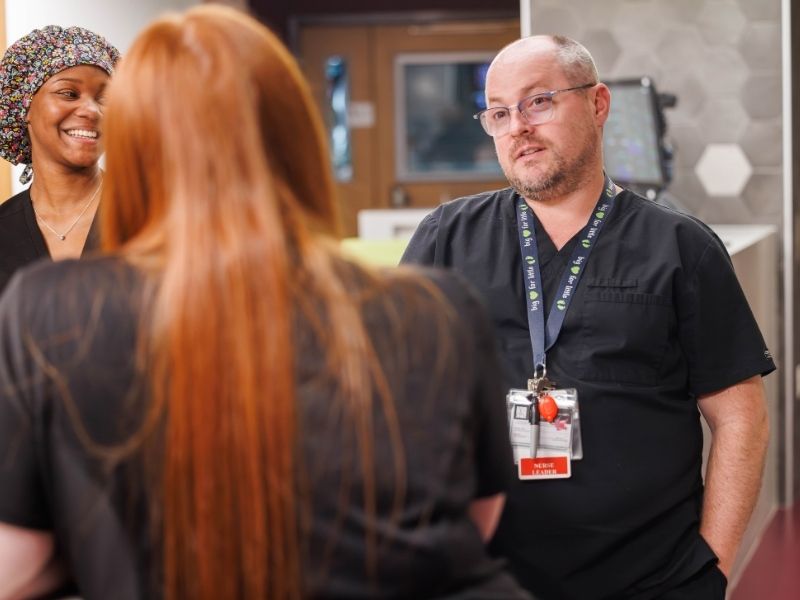
Michael Jones, manager of the Transition to Practice program at Children’s of Mississippi, had previously served as a NICU nurse at Children’s National in Washington, D.C.
“Magnet really brings clinicians to the forefront,” Jones, a UMMC School of Nursing alumnus said. “It provides a structure for clinicians to have a say about how the hospital is run. Front-line clinicians lead and participate in councils. As a nurse, I felt that my input was valued and that what I had to say mattered.”
Magnet designation also stresses interdisciplinary collaboration in efforts to improve care, he said.
As part of Children’s of Mississippi’s Magnet journey, Jones is helping to create a year-long transition-to-practice program for newly graduated nurses as well as transition programs for experienced nurses in new practice settings and those new to leadership roles.
“These programs will standardize professional development for new and experienced registered nurses and all disciplines and give them the best start to their careers,” Jones said.
Hansen said gaining the designation is a benefit to clinicians as well as patients.
“Magnet provides international recognition of the high caliber of our clinical staff,” she said. “Thirty-plus years of rigorous research have produced numerous articles on the superior outcomes of Magnet designated organizations.”
These include:
- Higher job satisfaction
- Higher likelihood to communicate errors and participate in error-related problem solving, contributing to improved patient safety
- Higher adoption of National Quality Forum safe practices
- Fewer adverse events
- Lower rate of occupational injuries
- Lower rate of catheter-associated urinary tract infections, pressure injuries and patient falls
- Higher patient satisfaction
Magnet hospitals attract and retain top talent because of the organization’s enhanced reputation, Hansen said.
Among the nation’s children’s hospitals with Magnet designation are Boston Children’s Hospital, Children’s Hospital of Philadelphia, Texas Children’s in Houston and Children’s National Hospital in Washington, D.C.
Ashley Darby, director of imaging services at UMMC, said one of the best facets of Magnet status is the interdisciplinary partnership it fosters.
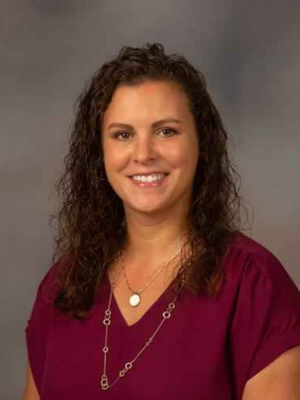
"The Magnet designation was originally intended to acknowledge nursing excellence,” Darby said. “However, its true value is promoting interprofessional collaboration and high-quality care throughout the entire organization. Children's of Mississippi has emphasized interprofessional governance, leadership and teamwork long before seeking Magnet designation. We recognize and appreciate the contributions of our colleagues in non-nursing departments such as Imaging Services, Respiratory Therapy, Sterile Processing, Rehab Services and Laboratory, among others. These contributions significantly impact clinical outcomes, patient experience and overall quality results. Interprofessionalism means that we are all striving together towards the highest standard of excellence.”
Other aspects of the Magnet journey are also beneficial, she said. “I particularly value our renewed focus on employee satisfaction and professional development. Our workforce is our most valuable asset, and I am enthusiastic about the initiatives these councils will undertake to support staff empowerment, well-being and development."
Currently, 77% of registered nurses at Children’s of Mississippi hold a Bachelor of Science degree in nursing, and Children’s is working to raise that to at least 80%.
“The University of Mississippi Medical Center School of Nursing offers wonderful RN-to-BSN and Accelerated Nursing programs,” Hansen said. “We are very fortunate to have our own School of Nursing right on campus.”
The RN-to-BSN track allows registered nurses with associate degrees to earn a bachelor’s degree. The Accelerated Nursing track at the UMMC School of Nursing offers people with bachelor’s degrees in fields other than nursing a way to earn a BSN in a year.
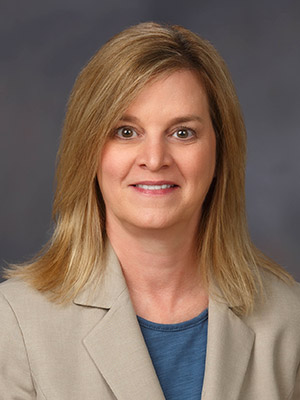
“The UMMC School of Nursing is dedicated to increasing the number of nurses with bachelor’s degrees or higher by making nursing education accessible,” said Dr. Tina Martin, dean of the school. “Not only are our students building upon their professional credentials by working toward a BSN, MSN or DNP, they are enhancing patient outcomes and fostering a culture of excellence.”

Keri Nobles, a registered nurse in the surgical suites of the Kathy and Joe Sanderson Tower, started her health care career as a surgical tech at UMMC three years ago. During that time, she earned an associate’s degree in nursing from Holmes Community College, and now she’s continuing her nursing education at the UMMC School of Nursing.
The RN-to-BSN program “is excellent for working nurses,” she said. “It’s flexible and has a pace that makes it easier to balance with a career.”
Nobles said the classes are sharpening her nursing knowledge, “picking up where I left off.”
So is Madeline Ingram, a registered nurse on the fifth floor of the Batson Tower, who also returned to school in the RN-to-BSN program.
“I’m excited because this will help me be a better leader,” she said, “and I am looking forward to developing more skills and applying them.”


